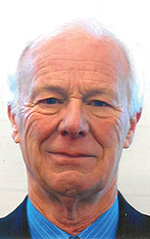On the Road from Sibiu
Reflections
BY JONATHAN B. RICKERT
In 1974 my wife, Gerd, and I were stationed at the U.S. embassy in Bucharest. After having spent the Christmas holidays out of the country, we found ourselves headed “home” in our Volvo, driving on a two-lane rural road about 25 kilometers south of Sibiu, Romania.
As we arrived midday in the vicinity of a small settlement called Riu Vadului, the car’s engine began to overheat terribly. Being very unmechanical, I stopped the car, raised the hood and stood there scratching my head. How were we going to get our vehicle fixed and get ourselves back to Bucharest from this mountainous wilderness?
After a short while, a young man in work clothes happened by and asked what the problem was. Fortunately, we were fluent in Romanian—thanks to Mr. Chiacu and FSI. So when he asked what the problem was, I immediately replied, “Nu stiu” (I don’t know). He smiled, and then offered to take a look. He quickly discovered that the fan had come loose and had punched a hole in the radiator, causing the coolant to drain out and the engine to overheat.
What can we do, I asked, to get the car going again?
The young man replied that a tractor repair station associated with the area’s forest industry was just up the road, and he was sure that the mechanics there could help. We slowly drove with him to the station, where the people he spoke with immediately agreed to undertake the necessary repairs.
For the next few hours, the mechanics dropped everything to attend to our Volvo. They not only patched the hole in the radiator, but also reconstructed the badly damaged fan. By late afternoon, the car was back in working order.
A young man in work clothes happened by and asked what the problem was. Fortunately, we were fluent in Romanian—thanks to Mr. Chiacu and FSI.
We were immensely grateful. Unfortunately, we had no Romanian currency with us (it was illegal to take lei into or out of the country), and paying them in dollars was not permitted. Although our benefactors insisted on no payment of any kind, we gave them some cigarettes (which served as a sort of alternative currency in Romania in those days) and Austrian cookies that we happened to have with us in the car.
Also, it being Saturday, the end of the six-day work week, we offered a ride to anyone who needed to travel to the south. It turned out many forest workers and mechanics spent the week at the job site and returned to their villages only for their free day, Sunday. Two of the men gratefully accepted our offer.
Driving southward, we had interesting conversations with our passengers about their working conditions, village life and the like.
I recall asking how hitchhiking functioned in Romania (we often saw people waiting at the side of the road, moving one hand up and down as they looked for rides). They explained that everyone knew how much it cost to travel by public transportation (usually a bus), and hitchhikers were expected to pay that amount to anyone who gave them a lift.
When we were about to let them off at their village, our passengers reached for their wallets. Surprised, we said that no payment was necessary, that we were happy to give them a ride. They apparently thought that I had asked about hitchhiking to discover how much to get paid, while in fact I had been motivated by simple curiosity. Expressing their thanks, they happily put their wallets away and trudged off to their homes.
At that time, remember, of course, Romania was a communist country and Warsaw Pact member. This experience only typified, however, the extraordinary kindness and generosity ordinary Romanians showed us during our stay in their country—as well as the benefits of fluency in their language.


